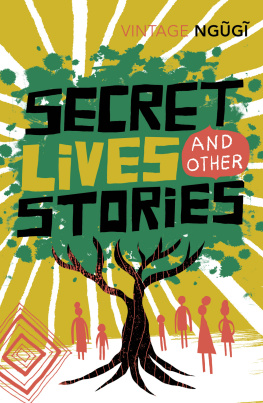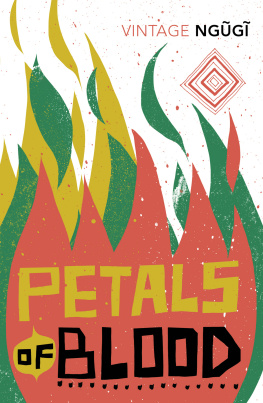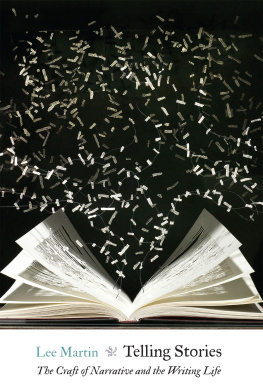Contents
About the Book
Ngg wa Thiongo is renowned for his political novels and plays, yet he honed his craft as a short story writer. First published in 1975, Secret Lives and Other Stories brings together a range of Nggs political short stories. From tales of the meeting between magic and superstition, to stories about the modernising forces of colonialism and the pervasive threat of nature, this collection celebrates the storytelling might of one of Africas best-loved writers.
About the Author
Ngg wa Thiongo is one of the leading writers and scholars at work in the world today. His books include the novels Petals of Blood, for which he was imprisoned by the Kenyan government in 1977, A Grain of Wheat and Wizard of the Crow; the memoirs, Dreams in a Time of War and In the House of the Interpreter; and the essays, Decolonising the Mind, Something Torn and New and Globalectics. Recipient of many honours, among them ten honorary doctorates, he is currently Distinguished Professor of English and Comparative Literature at the University of California, Irvine.
Also by Ngg wa Thiongo
Fiction
Wizard of the Crow
Petals of Blood
Weep Not, Child
The River Between
A Grain of Wheat
Devil on the Cross
Matigari
Plays
The Black Hermit
This Time Tomorrow
The Trial of Dedan Kimathi (with Micere Mugo)
I Will Marry When I Want (with Ngg wa Mri)
Memoirs
Detained: A Writers Prison Diary
Dreams in a Time of War: A Childhood Memoir
In the House of the Interpreter: A Memoir
Birth of a Dream Weaver: A Writers Awakening
Essays
Globalectics
Something Torn and New
Decolonising the Mind
Penpoints, Gunpoints, and Dreams
Moving the Centre
Writers in Politics
Homecoming
For Nyambura and Wanjiku
Preface
Sometime in 1960 I met Mr Jonathan Kariara outside the Main Hall of Makerere University College and on an impulse stopped him: I had written a short story and would he care to look at it? Mr Kariara was then in his final year as a student of English: he was very involved in Penpoint, a journal then at the centre of the creative efforts on Makerere Hill. I had told him a lie. I was then in my second preliminary year, and the story was only in my mind. But with my impulsive lie, I knew I had to write a story. This later became The Fig Tree (Mugumo in this collection) and Mr Kariara was very excited about it: had I been reading D. H. Lawrence, he asked, and I was impressed and very encouraged. That was the beginning of a fairly creative three-year period during which I wrote The Return, Gone with the Drought, The Village Priest, The Martyr, A Meeting in the Dark, And the Rain Came Down! and the first sketches of The Black Bird and The Mubenzi Tribesman, alongside two novels and a play. In 1964 the well for short stories dried up. I attempted to write about my encounter with England and failed. Yorkshire Moors, Bronts Countryside, the Scottish Highlands, especially Inverness of yellow gorse and silver birches: all these were beautiful yes, but they only made me vividly live the Limuru landscape with its sudden drop into the Rift Valley. Memories of beauty and terror. I wrote A Grain of Wheat.
In 1971 I returned to Kenya from a one-year spell teaching African Literature at Northwestern University in Evanston, Illinois. I looked at the tired and bewildered faces of the people: I went to places where people went to drown their memories of yesterday and their hopes and fears for tomorrow in drinking. I visited various bars in Limuru, drinking, singing and dancing and trying not to see or to remember. A friend told of an interesting episode. A barmaid had been arrested for stealing money from an aged trader, her one-night lover. The friend who told the story was condemning the rather petty and amateurish theft. But I was intrigued by the fact that the girl had returned to the same bar and for a whole day lived in an ostentatious display of wealth and well-being. That was the beginning of the three stories (Minutes of Glory, Wedding at the Cross and A Mercedes Funeral) which were meant to be the first in a series of secret lives. I also started working on a novel: how could I not see and hear and remember?
So that in a sense the stories in this collection form my creative autobiography over the last twelve years and touch on ideas and moods affecting me over the same period. My writing is really an attempt to understand myself and my situation in society and in history. As I write I remember the nights of fighting in my fathers house; my mothers struggle with the soil so that we might eat, have decent clothes and get some schooling; my elder brother, Wallace Mwangi, running to the cover and security of the forest under a hail of bullets from Colonial policemen; his messages from the forest urging me to continue with education at any cost; my cousin, Gichini wa Ngg, just escaping the hangmans rope because he had been caught with live bullets; uncles and other villagers murdered because they had taken the oath; the beautiful courage of ordinary men and women in Kenya who stood up to the might of British imperialism and indiscriminate terrorism. I remember too some relatives and fellow villagers who carried the gun for the white man and often became his messengers of blood. I remember the fears, the betrayals, Rachaels tears, the moments of despair and love and kinship in struggle and I try to find the meaning of it all through my pen.
On this road I have been helped and encouraged by many: Kariara, Joe Mutiga, G. G. Kuruma, Karienye Yohana, Ime Ikiddeh, Peter Nazareth, Hugh Dinwiddy, Chinua Achebe, and several others from Limuru. Encouraging, and touching too, have been the many letters from numerous boys and girls all over Kenya and whom I have never met. Currently I am deriving much pleasure and faith and hope from the exciting work being done at the University of Nairobi on African Literature, both oral and written. Taban lo Liyong, Okot pBitek, Eddah Gachukia, Chris Wanjala, Bhadur Tejani and other staff: hardly a month passes without our celebrating a literary event. And of course there is Busara, and the students Writers Workshop, and the drama society, and new exciting names on the Kenyan literary scene: Kibera, Kahiga, Charles Mangua, Mwangi Ruheni, Jared Angira, to mention a few.
And above all theres Nyambura, beautiful Nyambura: from her I have derived the strength to rise from constant moods of despair and self-doubt to celebrate a few minutes of glory. Hence the present offering of secret lives.
NGG WA THIONGO
1975
PART I
Of Mothers and Children
MUGUMO
Mukami stood at the door: slowly and sorrowfully she turned her head and looked at the hearth. A momentary hesitation. The smouldering fire and the small stool by the fire-side were calling her back. No. She had made up her mind. She must go. With a smooth, oiled upper-garment pulled tightly over her otherwise bare head, and then falling over her slim and youthful shoulders, she plunged into the lone and savage darkness.










